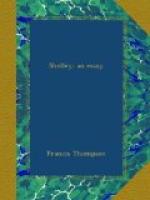Now Shelley never could have been a man, for he never was a boy. And the reason lay in the persecution which overclouded his school-days. Of that persecution’s effect upon him, he has left us, in The Revolt of Islam, a picture which to many or most people very probably seems a poetical exaggeration; partly because Shelley appears to have escaped physical brutality, partly because adults are inclined to smile tenderly at childish sorrows which are not caused by physical suffering. That he escaped for the most part bodily violence is nothing to the purpose. It is the petty malignant annoyance recurring hour by hour, day by day, month by month, until its accumulation becomes an agony; it is this which is the most terrible weapon that boys have against their fellow boy, who is powerless to shun it because, unlike the man, he has virtually no privacy. His is the torture which the ancients used, when they anointed their victim with honey and exposed him naked to the restless fever of the flies. He is a little St. Sebastian, sinking under the incessant flight of shafts which skilfully avoid the vital parts.
We do not, therefore, suspect Shelley of exaggeration: he was, no doubt, in terrible misery. Those who think otherwise must forget their own past. Most people, we suppose, must forget what they were like when they were children: otherwise they would know that the griefs of their childhood were passionate abandonment, dechirants (to use a characteristically favourite phrase of modern French literature) as the griefs of their maturity. Children’s griefs are little, certainly; but so is the child, so is its endurance, so is its field of vision, while its nervous impressionability is keener than ours. Grief is a matter of relativity; the sorrow should be estimated by its proportion to the sorrower; a gash is as painful to one as an amputation to another. Pour a puddle into a thimble, or an Atlantic into Etna; both thimble and mountain overflow. Adult fools, would not the angels smile at our griefs, were not angels too wise to smile at them?
So beset, the child fled into the tower of his own soul, and raised the drawbridge. He threw out a reserve, encysted in which he grew to maturity unaffected by the intercourses that modify the maturity of others into the thing we call a man. The encysted child developed until it reached years of virility, until those later Oxford days in which Hogg encountered it; then, bursting at once from its cyst and the university, it swam into a world not illegitimately perplexed by such a whim of the gods. It was, of course, only the completeness and duration of this seclusion—lasting from the gate of boyhood to the threshold of youth—which was peculiar to Shelley. Most poets, probably, like most saints, are prepared for their mission by an initial segregation, as the seed is buried to germinate: before they can utter the oracle of poetry, they must first be divided from the body of men. It is the severed head that makes the seraph.




